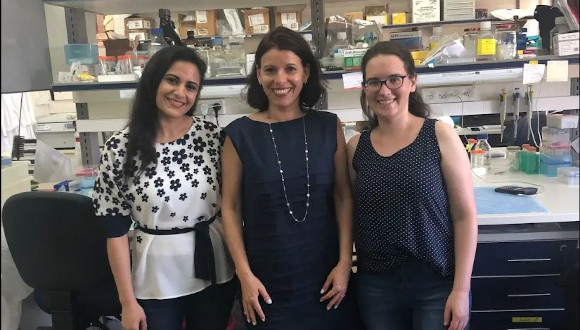Big ideas in breast cancer research at TAU

In honor of Breast Cancer Awareness Month, we’ve highlighted TAU scientists who are battling the leading cause of cancer death in women
Support this researchRanked among the top 100 schools in the world in the field of oncology, TAU remains committed to advancing critical research on the most common cancer in women worldwide. To that end, multidisciplinary teams at TAU are endlessly working to improve the understanding of breast cancer so that it may be better prevented, diagnosed, and treated. Instrumental to TAU’s pursuits in the field are the Shmunis School of Biomedicine and Cancer Research and the Cancer Biology Research Center. Here is a selection of recent developments by TAU faculty and clinicians at the frontlines of breast cancer research:
Preventing metastatic spread: Professor Neta Erez (Medicine) and her lab recently discovered a new warning sign indicating that breast cancer will spread to other parts of the body, or metastasize. The findings lay the groundwork for new preventive treatments that may save millions of lives. Read more here.
Powering predictive technology: Professor Tamir Tuller (Engineering) led a team that proved that so-called “silent mutations” can be analyzed using machine learning techniques to identify the type of cancer a patient has and to predict their chances of survival. Often overlooked, silent mutations are DNA glitches that aren’t easily observed and may affect cellular processes associated with the growth of cancer cells. The new approach is applicable to numerous cancer types, among them breast cancer. Read more here.
Identifying inherited risk: Professor Noam Shomron (Medicine) and colleagues took an important step that could help improve cancer screening and prevention. They identified a genetic predisposition that puts individuals at high risk for developing certain aggressive cancers, including breast cancer. Read more here.
Enhancing care with 3D: Dr. Ronit Satchi-Fainaro (Medicine, Cancer Biology Research Center) made waves with the world’s first fully-functioning 3D-bioprinted model of deadly glioblastoma brain tumors. Now she plans to expand the approach to other malignancies, including breast cancer, as a tool to accelerate new therapy testing, expedite treatment decisions, and improve patient outcomes. Read more here.
Progressing precision medicine: In recent studies, Professor Adit Ben-Baruch (Shmunis School of Biomedicine and Cancer Research, Life Sciences) and her team have identified several inflammatory mediators, or messengers, that advance tumor growth in breast cancer. The group has also identified immune cells that are associated with inhibiting tumor growth in triple-negative breast cancer, the most aggressive type of breast cancer. Her research may serve as the basis for more effective, personalized treatments. Read more about her research here.
Boosting noninvasive therapies: As part of her work focused on developing new ways to destroy cancerous tumors, Dr. Tali Ilovitsh (Biomedical Engineering) recently headed an international team that devised a noninvasive method for targeting and penetrating breast cancer cells. The technique combines ultrasound technology and tumor-targeted microbubbles that can be stimulated to explode and destroy cancerous cells. Read more here.
Cracking cancer genetics: Having uncovered a chromosomal trait in cancer cells that new drugs could target to destroy cancer, Dr. Uri Ben-David (Medicine) and his team are forging ahead with their work to decode cancer’s genetic signature. They are currently investigating the effects of a specific genetic abnormality often found in breast cancer.
Stimulating natural defenses: Professor Ariel Munitz (Medicine) and team showed that interactions between immune cells that were previously associated with allergies can help destroy malignant tumors in metastatic breast cancer patients. These findings may contribute to advances in the burgeoning field of immunotherapy, which stimulates the body’s immune system to fight cancer. Read more here.
Fuelling new therapy strategies: As part of an effort to boost endocrine therapies, using hormones, that inhibit the recurrence and spread of breast cancer, the laboratory of Professor Ido Wolf at the TAU-affiliated Sourasky Medical Center is working to decipher hormonal aspects of the development of breast cancer that metastasizes, or spreads, to the liver.